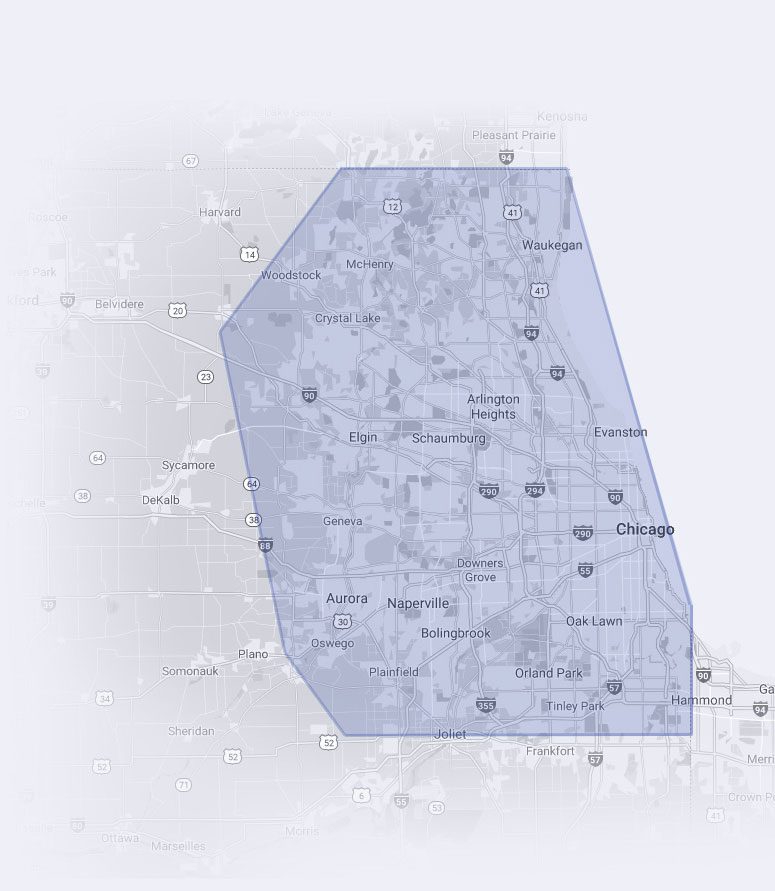What Are Gutter Extensions & Discharge Lines?
Gutter extensions and discharge lines carry water away from your foundation, preventing rain and groundwater from seeping into your basement or crawl space. The only difference is gutter extensions are connected to your downspouts, and discharge lines are connected to your sump pump. Both systems use the same pipe material and are installed right below your grass. Once we connect the piping to your downspouts or sump pump, we tie the other ends to a bubbler pot where any excess water that doesn’t seep into the ground can escape and filter into your soil.
Does Your Home Need Gutter Extensions & Discharge Lines Installed?
If your gutter downspouts drop water within 20 feet of your home, you need extensions. It’s estimated that for every 1,000 square feet of roof space, one inch of rain could produce 600 gallons of water. Increasing the inches of rain and square footage leads to more water. If this water drops into the soil around your foundation, it could eventually end up inside your basement or crawl space. If you have a sump pump installed, this excess water could overload the mechanics and cause it to shut down. If we install a sump pump in your foundation, we always include a discharge line. You need gutter extensions and discharge lines to ensure water is transferred away from your foundation.
Prevented Issues

Foundation damage

Water damage
How Are Gutter Extensions & Discharge Lines Installed?
Gutter Extensions & Discharge Lines Installer In Chicagoland
If you live in Chicagoland and need gutter extensions or discharge lines (which come with sump pumps), call The Real Seal Basement Waterproofing and Foundation Repair! We’ve successfully identified the root causes of waterproofing issues for basements, crawl spaces, and slab foundations since 2011. Call today for your free foundation inspection and personalized estimate.
What Our Customers Are Saying
I was contacted promptly, and arranged an complimentary inspection for a few days later. I received a confirmation the day before the visit with background on the inspector, Jim.
Jim was thorough, inspecting a variety of places both inside and outside, and taking plenty of pictures. He took the time to review his findings with me, and provided several recommendations (none involving the need for Real Seal). Jim was friendly, knowledgeable, and ethical.
I was very impressed, and would have no hesitancy about using Real Seal in the future.
In the end, we didn't need to do the repair as it wasn't deemed a true hazard. Even though we didn't wind up using their services, I was happy for the in-depth analysis from Jeff and the team.
George, our technician, did an outstanding job with the repair. During the process, he discovered a 2x4 that had been bolted directly into the foundation wall—a possible cause of the cracking we were seeing. He explained how that kind of pressure can lead to long-term structural issues, which we never would have realized on our own. George not only fixed the problem, but also walked me through the repair process and what was being done to ensure the wall would be properly supported going forward.
Both Rob and George were professional, knowledgeable, and respectful throughout. It’s rare to find a company where both the inspection and the repair sides are this strong. I’d highly recommend Real Seal to anyone needing foundation repair or basement waterproofing. Their team brings both skill and great communication—exactly what you want for something as important as your home’s foundation.
If you have a crawlspace want to add square footage to your home (or have a nice new spot to wait out tornados), I highly recommend reaching out to Real Seal about a conversion.
Gutter Extensions & Discharge Lines FAQs

Are gutter extensions necessary?
Yes. Gutter extensions prevent water from pouring at the base of your foundation.

How far should rain gutters extend from my house?
At least 20 feet.

Why does rainwater go behind my gutters?
It’s possible that your gutters are clogged with leaves and debris. Make sure you clean them often.

What is the best gutter extension?
The Real Seal uses Schedule 35 PVC pipes, and we stand by our materials.

Should my gutter extension go into the ground?
Yes. Placing them underground conceals them and prevents them from being damaged.

Where do I discharge my sump pump water?
We place bubbler pots at the end of our discharge lines and gutter extensions. This allows water to be deposited into a lower part of your property.

How far can you run a sump pump discharge line?
We always recommend running discharge lines at least 20 feet away from your home and foundation.

How deep should a sump pump discharge line be buried?
We bury our discharge lines right below your grass.

Can I discharge my sump pump into the street?
Some municipalities do allow you to connect your discharge lines into the street storm sewer with a solid connection. This typically requires a permit and evaluation from the city.
SERVICE AREA
Waterproofing basements in Chicagoland and surrounding areas.
- Addison
- Arlington Heights
- Aurora
- Barrington
- Bartlett
- Berwyn
- Bolingbrook
- Buffalo Grove
- Calumet City
- Chicago
- Crystal Lake
- Deerfield
- DesPlaines
- Downers Grove
- Elgin
- Elk Grove
- Elmhurst
- Evanston
- Fox River Grove
- Glendale Heights
- Glenview
- Highland Park
- Hoffman Estates
- Joliet
- Lake Forest
- Lake Zurich
- Libertyville
- Lombard
- Mount Prospect
- Naperville
- Niles
- Northbrook
- Oak Park
- Oak Lawn
- Orland Park
- Oswego
- Palatine
- Park Ridge
- Plainfield
- Roselle
- Schaumburg
- St. Charles
- Skokie
- Tinley Park
- Waukegan
- West Chicago
- Wheaton
- Wilmette
- Winnetka
- Woodstock
- Woodridge





































